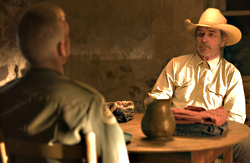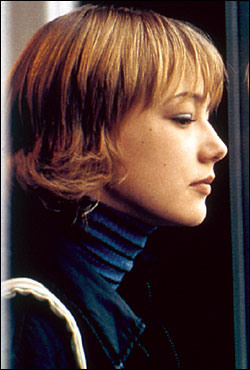With his new film, The Three Burials of Melquiades Estrada (which opens Friday, Feb. 3, at the Metro and Meridian), Tommy Lee Jones has directed a contemporary Western about honor and redemption that’s as fierce and biting as mescal. His own performance, as a ranch foreman in a Tex-Mex border town who becomes the story’s dogged conscience, is quietly and dangerously good—good enough to win him the acting award at Cannes ’05. (Guillermo Arriaga’s screenplay was also honored.) Yet Pete Perkins isn’t Jones’ star turn; it’s simply the pivotal role of this brutally direct morality play, a firsthand look, among other things, at what it really means to walk in someone else’s shoes.
Anyone familiar with the Mexican screenwriter’s earlier, incendiary films, Amores Perros and 21 Grams, will recognize his method of riffling past and present. He does it again in the opening quarter of Burials, giving us a first, second, third version of an incident, until we almost literally stumble onto the truth of the death of the generous, sweet-natured vaquero Melquiades (Julio Cesar Cedillo in a beautifully nuanced performance), who’s Mexican, illegal, and probably Pete’s closest friend. But first we get a feeling for this scrub-ugly Texas town, where selling overpriced double-wides to young federal border patrol officers’ families is almost an industry, since the turnover is so high. Mike Norton (Barry Pepper) is the newest recruit, settling in uneasily with his equally tall, equally blond, but not-so-equally-stupid wife, Lou Ann (January Jones—no relation). It’s a long way from Cincinnati, where they reigned in high school, to the dust and the glare and the nothing to do of Van Horn, Texas. Suddenly, Lou Ann has only TV, cigarettes, and the town cafe for diversion, while Mike’s outlet for his ugly worldview is to brutalize the scrambling illegals he catches—women and men equally.
When Rachel (Melissa Leo), the cafe’s waitress and the film’s seer, overhears the truth of “Mel’s” death, Pete knows almost as soon as we do who shot his friend, and how little is going to be done about it by Belmont (Dwight Yoakam), the ferrety town sheriff. Rachel absorbs every scrap of news since she’s sleeping, sequentially, with Pete, Belmont—distasteful as that seems—and her older, mostly silent husband, who owns the cafe.
After being shut down by Mike’s superiors, Pete moves rattler-fast, like any grizzled, self-respecting Sam Peckinpah character (or John Huston or even Luis Buñuel; they’re all influences here). At stake is a promise he made Mel: not to let him be buried on this side, under billboards, but to take him home to his wife and three children, well inside Mexico.
That trip is the film’s heart and moral lesson, as the flashbacks slow down slightly, but swiftly edited scenes keep track of both sides of the border. Kidnapping Mike, Pete has the blubbering, retching officer dig up Melquiades’ slowly rotting body, drink from Mel’s cup at the man’s spare, neat house, then put on Mel’s work clothes—after he’s dressed the dead man in his Sunday best. Then, on horseback, they set out on this sacred duty, carrying the body and being tracked in cars and helicopters by half the badges in Texas.
Melquiades remains a presence throughout the journey, a too-solid and slowly decomposing reminder of the shortness of life and the stubbornness of death— and there’s an antic bite to Pete’s tender, sometimes drunken attempts to keep ants and rot at bay.
If it weren’t already clear that few of the story’s gringos are any damn good at all, the blanket generosity and openness of everyone Pete and Mike encounter on this pilgrimage makes the point—repeatedly. (There is one blindingly well-deserved act of revenge, but it’s a clear exception.) We can see, through Chris Menges’ camera’s eye, how verdant and unspoiled the country looks; the people are no less so. It’s enough to wish that Jones had roped in his former Lonesome Dove collaborator, Larry McMurtry, for just one slightly less sentimental moment. (My breaking point, the worm in my mescal, arrived as Pete—solo—stops at a simple, smoky roadside cantina to get drunk and call Rachel. There are tiny Christmas lights strung haphazardly overhead, and through the din, an angelic little girl, about 8 or 10 years old, is at a woefully out-of-tune piano—picking out a Chopin étude. This sort of thing can knock me off track for reels.)
As he did with his sweeping 1995 made-for-cable Western The Good Old Boys, Jones casts impeccably: Then it was Frances McDormand, Sissy Spacek, Sam Shepard, and a prestardom Matt Damon. Here it’s Leo, Yoakam, Cedillo, and Pepper—the latter bitter, bigoted, and in his wife’s own words, “beyond redemption.” He fights back every inch as he’s dragged, lassoed, and almost drowned along the treacherous route south. It’s the voracious physicality of Pepper’s fury and frustration throughout that gives his—and the film’s—last line its extraordinary power. Equally magnificent is Leo, who seems to be the quintessential good-timin’ woman, until you look a little closer. And there’s a marvelously touching performance by Levon Helm as a blind rancher, whose ability to see and understand everything from a man’s voice is profound.
Quibbles far aside, Jones has made a film with reverberations on every level—not the least of which is the movie’s great use of music, as Freddy Fender, Merle Haggard, Hank Williams Jr., and Bobby Flores reinforce the film’s bedrock reality.








